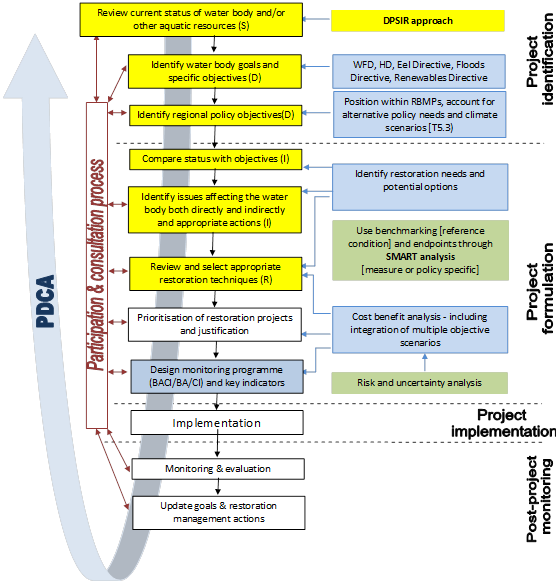With an increasing emphasis on river restoration comes a need for new techniques and guidance. Tools are needed to assess stream and watershed condition, to identify factors degrading aquatic habitats, to select appropriate restoration actions, and to monitor and evaluate restoration actions at appropriate scales. Unfortunately, despite the rapid increase in river restoration projects, little is known about the effectiveness of these efforts. Restoration outcomes are often not fully evaluated in terms of success or reasons for success or failure. Workpackage 5.1 of REFORM has gone a long way to addressing some of these needs by developing a protocol for restoration project planning that incorporates benchmarking and setting specific and measurable targets for restoration and mitigation measures (Figure 1). The approach uses project management techniques to solve problems and produce a strategy for the execution of appropriate projects to meet specific environmental and social objectives. It requires knowledge of the technical issues and policy framework and background to conflicts of multiple users of resources and develops a plan for comparison of status with objectives. Such resource planning should become an integral part of the river basin management, and full consultation with all aquatic user groups is essential to promote optimal, sustainable use of the water body whilst meeting WFD targets.
In using this strategy, it is important to recognise that each restoration scheme proposal should be treated individually, as no two situations are alike. It is therefore impossible to provide threshold criteria on which to make decisions. Nevertheless, the decision support tool allows the proposal to be evaluated at different levels and stages and will effectively curtail a proposal at an early stage should the proposal be potentially impractical or unviable.

Figure 1. Proposed planning protocol for restoration projects - yellow coloured boxes represent steps in the DPSIR approach to management intervention. Figure: Ian Cowx.
Further Links
Link to D5.1 on the REFORM website: http://www.reformrivers.eu/deliverables/d51-review-methodologies-benchmarking-and-setting-end-points-restoration-projects
Authors
Ian Cowx and Nathalie Angelopoulos, the University of Hull – International Fisheries Institute
